How to Create Effective Google Ads for Law Firms: Proven Strategies for Success
Google Ads is a powerful tool targeting potential clients seeking legal services. This article provides a guide on how to create effective Google Ads. You’ll also gain a strong understanding of proven strategies for success in your Google Ads campaigns.
Contents
- Understanding the Basics of Google Ads
- Keyword Research and Selection
- Crafting Compelling Ad Copy
- Organising Your Ad Campaigns
- Designing High-Converting Landing Pages
- Budgeting and Bidding Strategies
- Location Targeting
- Compliance with Legal Advertising Regulations
- Regular Monitoring and Optimisation
- Conclusion
Understanding the Basics of Google Ads
Google Ads is a pay-per-click (PPC) advertising platform where law firms and solicitors can create and display ads on Google’s results pages and across the Google Display Network. These ads appear when users search for keywords and phrases related to your legal services.
Google Ads allows you to pay for prominent visibility to potential clients actively seeking legal assistance. You bid on keywords and phrases, and your ad may appear when a user’s search query matches your selected keywords. You only pay when a user clicks on your ad, making it a cost-effective method of reaching your target audience.
Benefits of Google Ads for Law Firms
The adoption of Google Ads by law firms and solicitors comes with several compelling benefits:
1. Immediate Visibility
Google Ads offers an almost instant means of being visible to potential clients. Your ads can begin running shortly after set up, ensuring you’re in front of users actively searching for legal services.
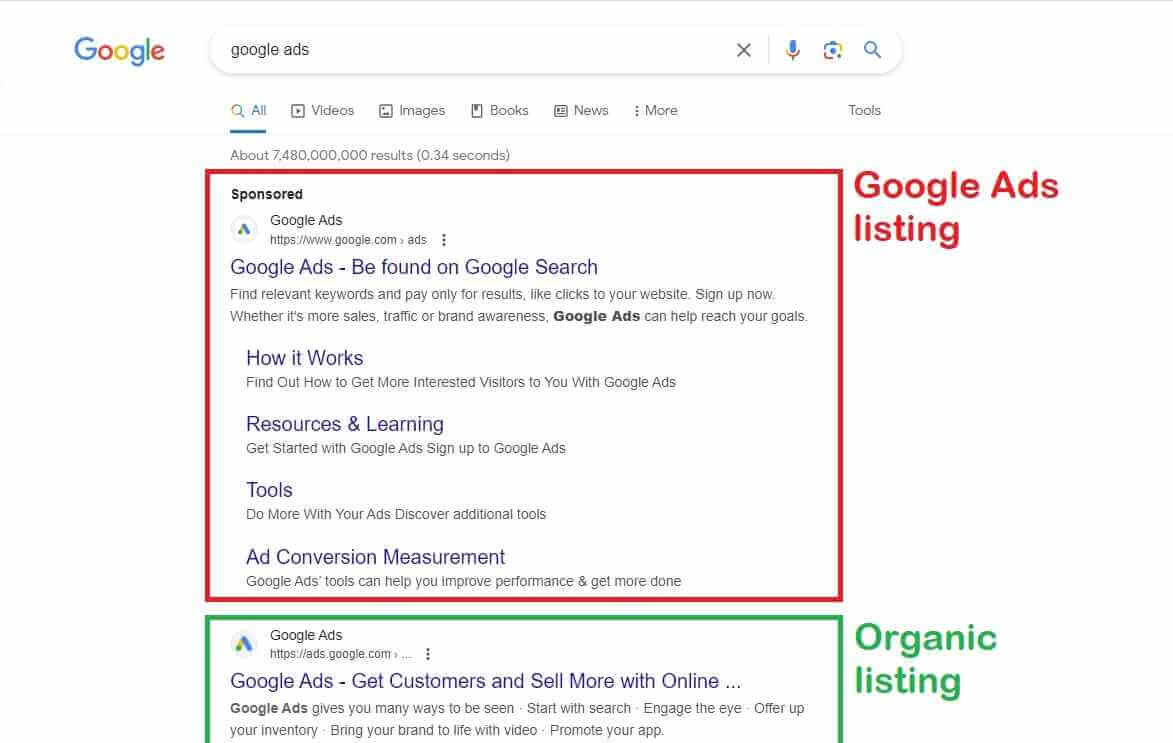
2. High Customizability
Google Ads provides extensive customisation options, allowing you to tailor your campaigns to both your target audience and your specific goals and budget. You can control the ad copy, audience demographic, keywords, and more.
3. Precise Targeting
This platform allows you to target specific geographic regions, ensuring your ads appear to users in your service area. For law firms with a local focus, this feature is invaluable.
4. Comprehensive Analytics
Google Ads provides detailed performance tracking and analytics. This data allows you to gauge the effectiveness of your campaigns, track user interactions, and make data-driven decisions to optimise your strategy.
Legal Advertising Considerations
When utilising Google Ads for legal services, it’s imperative to be mindful of legal advertising considerations:
1. Compliance with Regulations
Legal advertising is subject to specific regulations that may vary by jurisdiction. Ensure your ad content aligns with local, state, and national legal advertising regulations. Avoid misleading or inaccurate information in your ads to maintain trust and credibility.
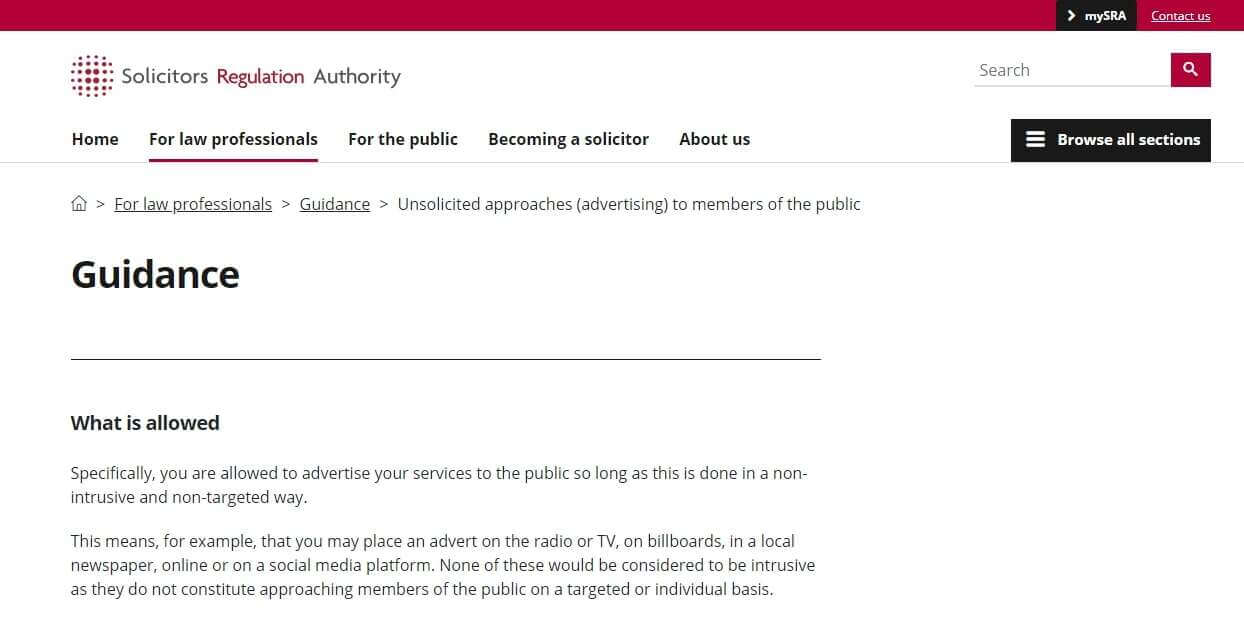
2. Transparency and Accuracy
Your ad content should accurately represent your legal services and qualifications. Transparency is key in building trust with potential clients. Be clear about what you offer, your areas of expertise, and how you can assist clients.
3. Consultation and Legal Counsel
When legal advertising regulations are complex, consult with legal advertising authorities or seek legal counsel to ensure compliance with the law. This step helps you avoid potential legal pitfalls while promoting your legal services.
Keyword Research and Selection
Keyword research, powered by tools like the Google Keyword Planner within Google Ads, is the cornerstone of a successful Google Ads campaign for law firms and solicitors. It is a process where you identify the specific keywords and phrases potential clients use when searching for your legal services.
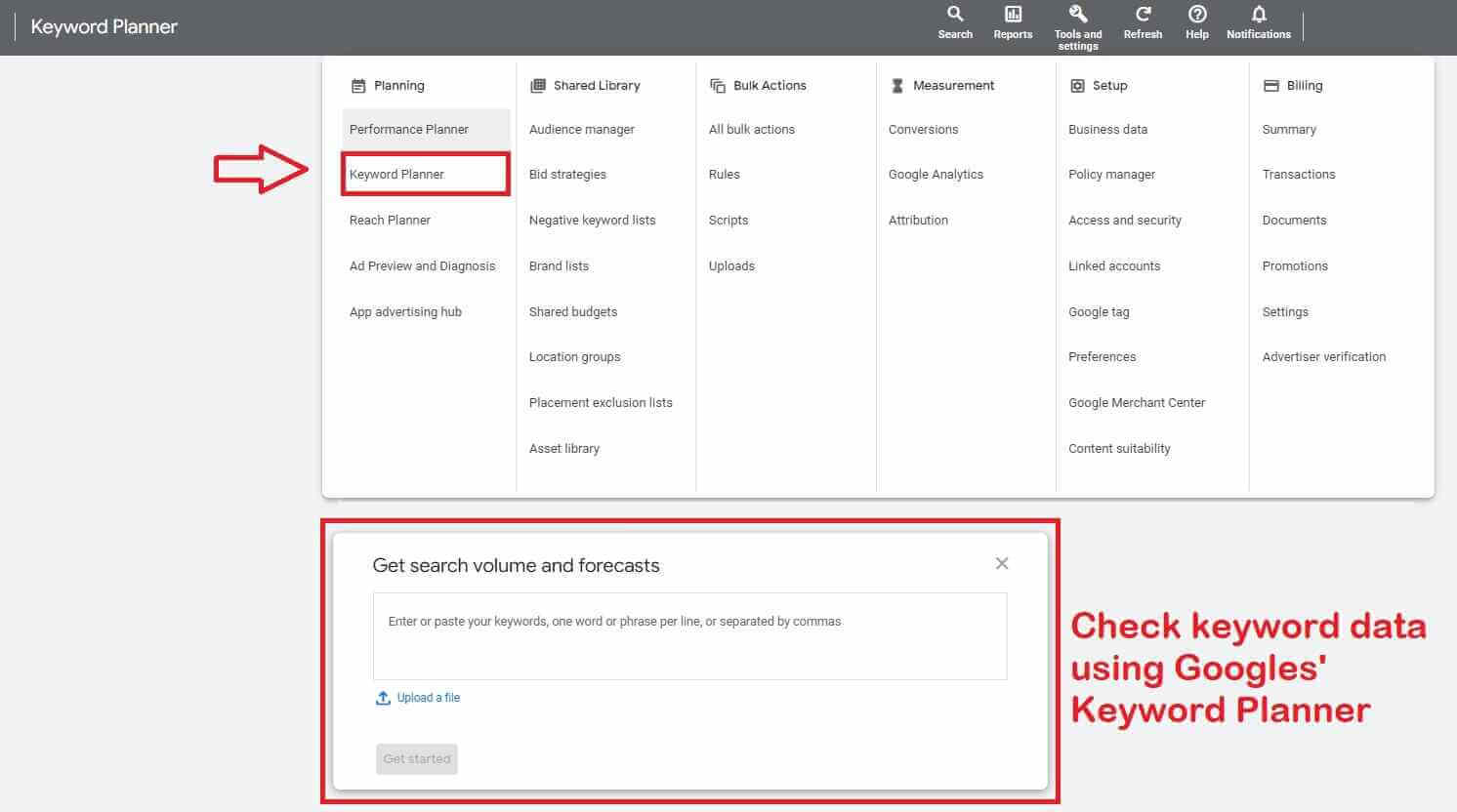
Identifying Relevant Keywords for Legal Services
It is paramount to choose relevant keywords that align with your practice areas. This entails identifying terms potential clients will likely use in their search queries. For instance, if your firm specialises in family law, keywords such as “family law attorney,” “child custody lawyer,” or “divorce lawyer” are essential.
Using Location-Based Keywords
Incorporating location-based keywords is a strategic move for law firms with a localised client base. These keywords include geographic references, such as the name of your city, to ensure that your ads are displayed primarily to users within your service area. For instance, “divorce lawyer in York” is an example of an effective location-based keyword.
Long-Tail Keywords and Their Role
Long-tail keywords are highly specific phrases that extend beyond the broader terms often used in keyword research. While they may have lower search volumes, long-tail keywords are valuable for several reasons:
1. Specific Targeting
Long-tail keywords can help narrow your focus and target potential clients with exact needs. For example, “child custody lawyer for fathers in London” is a long-tail keyword that caters to a specific clientele.
2. Lower Competition
Long-tail keywords typically have lower competition compared to broad, highly competitive keywords. This can lead to lower costs per click and a more budget-effective approach to advertising.
3. Higher Conversion Rates
Users searching with long-tail keywords often have a clear intent. You can achieve higher conversion rates by addressing their specific needs in your ad copy and landing pages.
It’s essential to balance using relevant, high-traffic keywords and incorporating long-tail keywords that cater to specific client needs. This approach ensures that your Google Ads are visible and appealing to users actively seeking legal services.
Crafting Compelling Ad Copy
Crafting ad copy for your Google Ads that is engaging and compliance-friendly is a vital skill in legal advertising. The objective is to capture the attention of your potential clients while staying within the boundaries of legal advertising regulations.
1. Clarity and Transparency
Be clear and transparent about your legal services. Avoid misleading or inaccurate information at all costs.
2. Compliance with Regulations
Ensure that your ad content adheres to legal regulations specific to your jurisdiction. Legal advertising authorities may have strict rules governing the language and claims you can make in your ads.
3. Engagement Without Hype
Create ad copy that engages users without resorting to exaggerated claims or hyperbole. Focusing on your law firm’s strengths and services is critical to building trust.
Showcasing Unique Selling Points
You should highlight your law firm’s unique selling points. These characteristics set your practice apart and provide a solid reason for potential clients to choose your services.
1. Years of Experience
Your firm’s long history and extensive experience in the legal field can be a persuasive selling point. Mention the number of years your firm has been in practice.
2. Successful Case Outcomes
Emphasise your firm’s track record of successful case outcomes. This is a valuable selling point if you’ve achieved significant victories for clients.
3. Free Consultations
Offer free initial consultations as an attractive proposition for potential clients. It allows them to discuss their legal needs without an initial financial commitment.
4. Legal Specialisations
If your firm specialises in specific areas of law, such as family law, personal injury, or immigration law, make this a prominent part of your ad copy. Potential clients often seek lawyers with expertise in their particular legal issue.
Organising Your Ad Campaigns
Creating an organised and effective campaign structure is the foundation of a successful Google Ads campaign for law firms and solicitors. This structure is pivotal for ensuring that your ad campaigns are well-targeted, efficiently managed, and capable of delivering the desired results.
1. Logical Grouping
Organise your ad campaigns in a logically structured manner. Each campaign should have a distinct focus and goal. For example, you might create separate campaigns for different practice areas or service types.
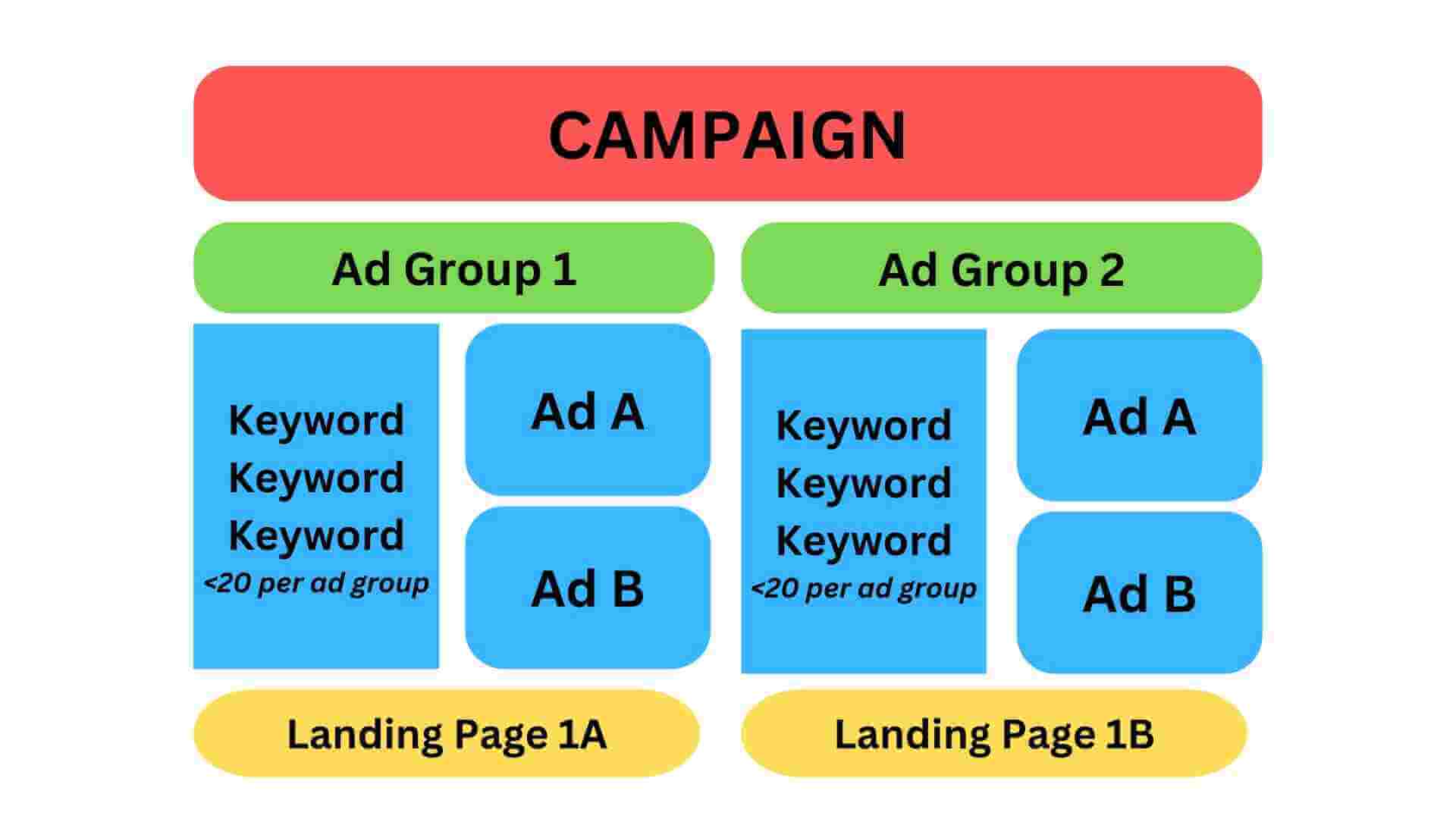
2. Budget Allocation
Allocate your budget thoughtfully across campaigns. High-priority practice areas or campaigns should receive more of your budget to maximise visibility.
3. Ad Scheduling
Consider the timing of your ad campaigns. Determine the days and hours when your ads should run to align with the peak periods of potential client activity.
If you’re unsure when to schedule your adverts, you can use data from Google Ads built-in analytics to understand when your users are actively searching for your services.
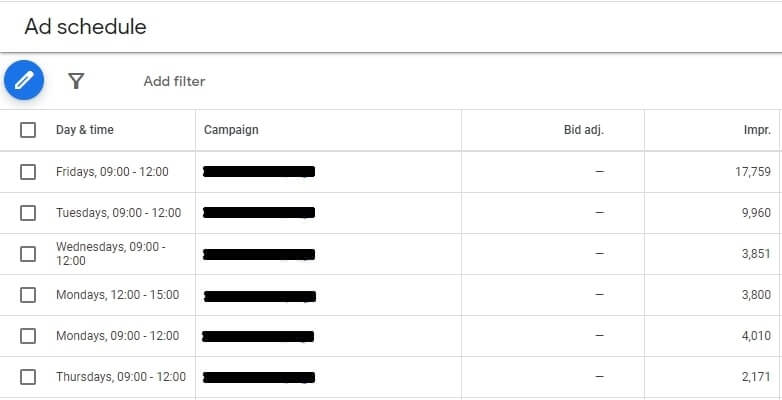
Ad Group Segmentation by Practice Areas
Within each campaign, further segmenting ad groups according to practice areas is a critical step. This segmentation is essential for enhancing ad relevance and ensuring that your message aligns with the specific legal needs of potential clients
1. Focused Keywords
Each ad group should revolve around a specific set of related keywords. This ensures that your ad copy is directly relevant to the search queries users enter.
2. Tailored Ad Copy
Customise your ad copy to match the practice area or service you promote within that ad group. Highlight the unique selling points and benefits pertinent to that specific legal area.
3. Improved Quality Score
Ad group segmentation boosts Quality Score, Google’s measure of ad relevance. Higher Quality Scores lead to better ad placement and lower costs per click (CPC).
Designing High-Converting Landing Pages
Landing pages serve as the virtual doorstep of your law firm, the first interaction potential clients have after clicking on your ad. The role of a well-crafted landing page is paramount, as it can be the decisive factor in turning a casual visitor into a client.
1. Relevance and Consistency
When a user clicks on your ad, they should find a landing page that directly addresses the legal service or practice area promoted in the ad.
2. Conversion Focus
The primary goal of a landing page is conversion. You must design it to lead users to a specific action, such as contacting your law firm, scheduling a consultation, or requesting more information.
3. Optimised User Experience
A user-friendly landing page ensures that potential clients have a positive experience. It should load quickly, navigate easily, and provide relevant information.
Elements of a Conversion-Focused Landing Page
1. Clear and Compelling Headlines
A powerful headline should communicate your legal services’ primary benefit or unique selling proposition. It’s the first thing users see, so it needs to capture their attention.
2. Call-to-Action (CTA) Buttons
Prominent CTA buttons with action-oriented text, like “Contact Us,” “Schedule a Consultation,” or “Get Started,” are essential. They guide users toward the desired action.
3. Contact Information
Ensure your landing page prominently displays contact details, including a phone number and a user-friendly contact form. Potential clients should have multiple options to reach you.
4. Information About Your Legal Services
Provide concise yet informative content about your legal services, practice areas, and your law firm’s expertise. Address the specific needs and concerns of potential clients.
5. Trust Signals
Building trust is crucial. Include client testimonials, awards, legal association affiliations, and mentions in respected publications. These elements reinforce your credibility.
Building Trust and Credibility
Trust and credibility are pivotal in the legal industry, where clients often entrust their most personal and sensitive matters to their chosen law firm.
1. Client Testimonials
Genuine testimonials from previous clients can be compelling. Showcase success stories and positive experiences to instil trust in potential clients.
2. Awards and Recognitions
If your law firm has received awards or recognitions, proudly display them on your landing page. These serve as third-party validation of your legal expertise.
3. Legal Credentials
Highlight any legal credentials, certifications, or affiliations with legal associations. These credentials reassure potential clients of your professionalism and competence.
4. Transparency
Be transparent about your services, pricing structure, and client experience. Honesty and transparency go a long way in building trust.
5. Privacy and Security
Assure potential clients that you handle their personal information carefully and strictly with legal regulations. If applicable, display trust symbols and security assurances, such as SSL certificates.
A well-structured landing page that inspires trust and emphasises conversion can substantially enhance the effectiveness of your Google Ads campaigns for your law firm.
Budgeting and Bidding Strategies
Your budget defines the scope and reach of your Google Ads campaigns, making it essential to allocate resources wisely.
1. Define Clear Objectives
Begin by outlining your advertising goals. What do you want to achieve with your Google Ads campaigns? Clear objectives will guide your budgeting decisions, whether it’s increasing website traffic, generating leads, or acquiring new clients.
2. Assess Competitiveness
Understand the competitiveness of keywords in your legal niche and geographic area. More competitive keywords may require a higher budget to achieve the desired visibility.
3. Consider ROI
Weigh the potential return on investment (ROI) against your budget. Evaluate how much you will spend to acquire a new client and tailor your budget accordingly.
Success in Google Ads campaigns is not solely about the budget’s size; it’s about allocating resources judiciously to meet your specific legal advertising goals.
Location Targeting
Geo-targeting, or location targeting, allows you to narrow your ad’s visibility to specific geographic areas, ensuring individuals within your service region see your services.
1. Local Relevance
For law firms with a localised clientele, geo-targeting is indispensable. It ensures users within your practice area, city, county, or region see your ads.
2. Local Competition
Local law firms often face competition from others in their vicinity. Geo-targeting lets you focus your budget and resources on reaching potential clients within your service area rather than wasting ad spend on users outside your reach.
3. Ad Customisation
Geo-targeting allows for the customisation of ad content based on location. You can tailor your messaging to address clients’ specific legal needs or concerns within a given geographic area.
Reaching the Right Audience Geographically
Reaching the right audience is the cornerstone of location targeting in Google Ads. Here’s how you can achieve it effectively:
1. Location Settings
You can define the geographic regions you want to target in your Google Ads campaign settings. This can be as broad as an entire country or as specific as a radius around your law firm’s physical location.
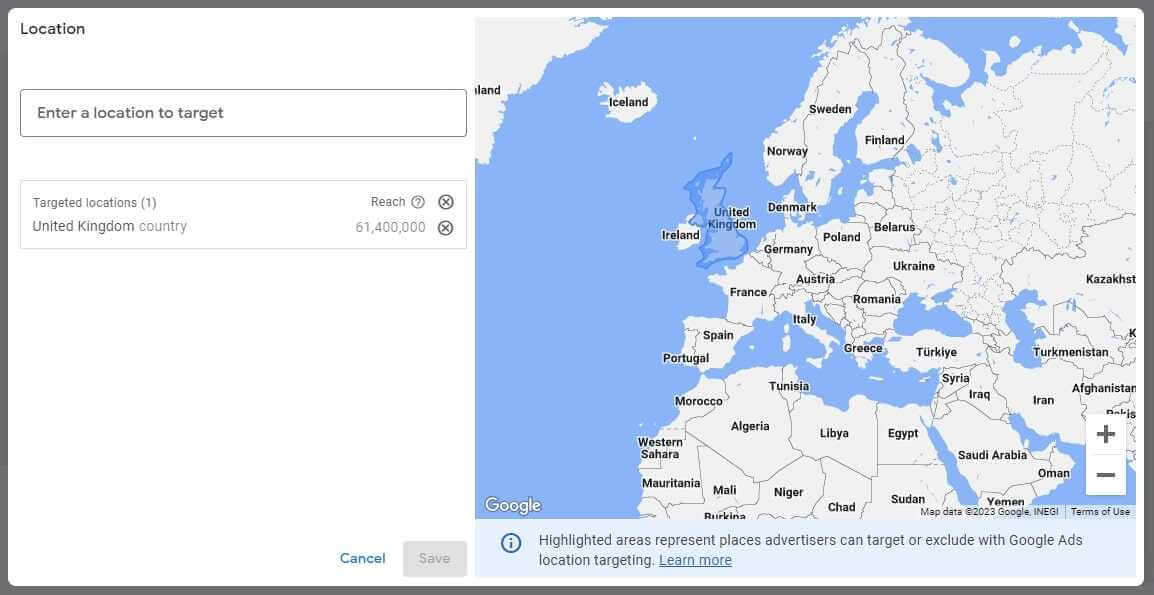
2. Local Keywords
Integrate location-specific keywords into your campaign. For instance, if you’re a family law firm in Northampton, using keywords like “Northampton family lawyer” will enhance your chances of reaching the right local audience.
3. Local Ad Extensions
Utilise location-based ad extensions to display your law firm’s physical address. This information can be crucial for potential clients looking for a nearby legal service provider.
4. Mobile Optimisation
Since many users now access the internet via mobile devices with GPS capabilities, ensure your landing pages are mobile-friendly and optimised for local searches.

5. Analytics Insights
Regularly review location data and performance metrics in your Google Ads account. This information can guide you in refining your geo-targeting strategy and focusing on areas with the highest potential for client acquisition.
For local law firms, location targeting is a strategic necessity. It empowers you to concentrate your advertising efforts on the audience most likely to require your legal services within your specific geographic region, optimising your ad campaigns for maximum local impact.
Compliance with Legal Advertising Regulations
Compliance with legal advertising rules and regulations is an ethical and legal obligation. These regulations are in place to maintain the integrity and professionalism of the legal industry.
1. Jurisdictional Variations
Legal advertising regulations can vary by jurisdiction. You need to be aware of and adhere to the specific rules in your location. This includes national and local regulations.
2. Bar Association or Law Society Guidelines
Your law firm should follow the guidelines of your association or society, which often pertain to issues such as attorney advertising, solicitation, and client confidentiality.
3. Transparency and Accuracy
Regulations often require advertising to be transparent and accurate. Your law firm must provide truthful information about their services, fees, and qualifications.
4. Prohibited Content
Legal advertising regulations may prohibit certain content, such as false claims, misleading statements, or guarantees of specific outcomes in cases.
Ensuring Ad Content Adheres to Legal Standards
Adhering to legal standards in your advertising is a legal requirement and an ethical commitment to potential clients. Here’s how to ensure your ad content complies with legal standards:
1. Consult Legal Experts
If you need clarification on the regulations in your jurisdiction or the compliance of your ad content, consult with legal experts who specialise in legal advertising. They can provide guidance and review your advertising materials for compliance.
2. Clear and Accurate Information
Ensure that the information presented in your ads is precise and accurate. This includes specifying your law firm’s services, areas of practice, and the nature of your legal assistance.
3. Avoiding Misleading Statements
Avoid making misleading statements or guarantees. For example, claiming a 100% success rate or promising specific outcomes in legal cases is often prohibited.
4. Maintain Client Confidentiality
Respect client confidentiality at all times. Do not reveal sensitive client information or use client endorsements without their consent.
5. Stay Informed
Stay informed about any changes in legal advertising regulations in your jurisdiction. These rules can evolve, and it’s essential to adapt your advertising accordingly.
6. Record Keeping
Maintain records of your advertising campaigns and materials. This can be crucial in the event of a regulatory inquiry or audit.
Regular Monitoring and Optimisation
Ongoing campaign management is a necessity for maintaining the effectiveness of your Google Ads campaigns. Here’s why it’s crucial:
1. Changing Dynamics
The digital landscape is dynamic, and the legal industry is no exception. Ongoing campaign management allows you to adapt to changes in user behaviour, market trends, and your competition.
2. Budget Efficiency
Regular monitoring ensures that your ad spend is used efficiently. You maximise your budget’s impact by identifying underperforming areas and reallocating resources.
3. Quality Assurance
It’s essential to maintain the quality and relevance of your ads. Regular management ensures your ad content remains aligned with user intent and updated with the latest legal developments.
Staying Competitive in the Legal Industry
In the highly competitive legal industry, staying competitive is paramount. Regular campaign management and optimization are essential for maintaining your edge:
- Ad Rank is determined by factors like Quality Score, bid amount, and ad relevance, which directly impact your ad’s position on the search engine results page. Regular optimisations improve your Ad Rank, increasing visibility.
- Competing effectively often involves judicious budget allocation. Identify high-performing campaigns and focus resources where they matter most.
- Users are more likely to engage with ads that directly address their needs. Regular optimisation ensures that your ads remain closely aligned with user intent.
- The legal landscape evolves – staying competitive means updating your ad content with current legal trends and regulations.
Conclusion
For Law firms and solicitors seeking to expand their client base and establish a solid online presence, Google Ads offers a powerful platform.
Google Ads can be a powerful ally on your journey to success in legal advertising. Embrace these strategies and be open to continuous improvement, and your law firm can flourish in the digital age.
At Kinetic Traffic, we understand legal professionals’ unique challenges and opportunities in online advertising. Our digital marketing experts specialise in crafting and managing Google Ads campaigns tailored to the specific needs of lawyers and solicitors. Contact us today to learn more about our specialised services.
Lead your law firm towards the best results.
Get in touch with our team and let’s talk about your marketing needs.










